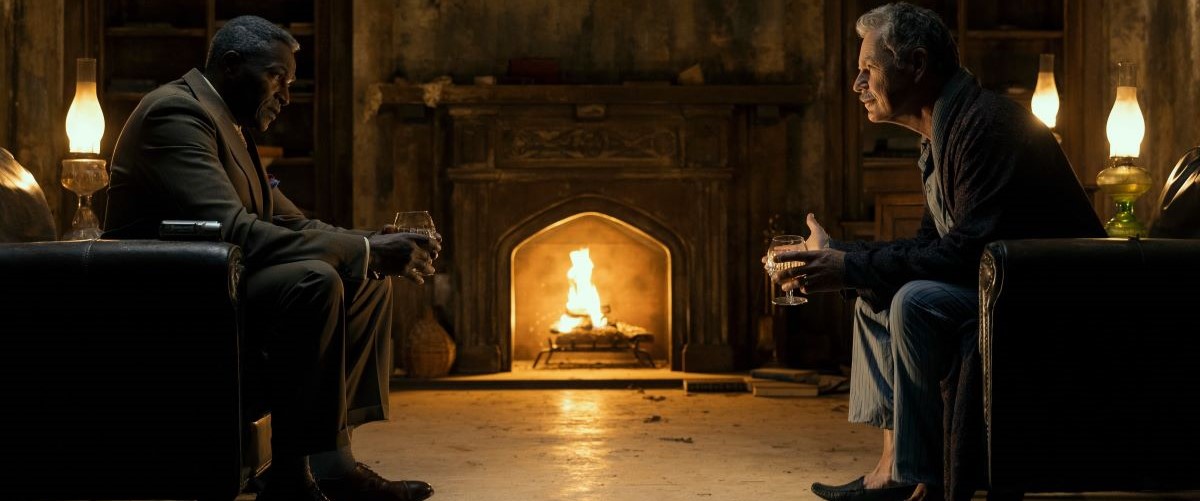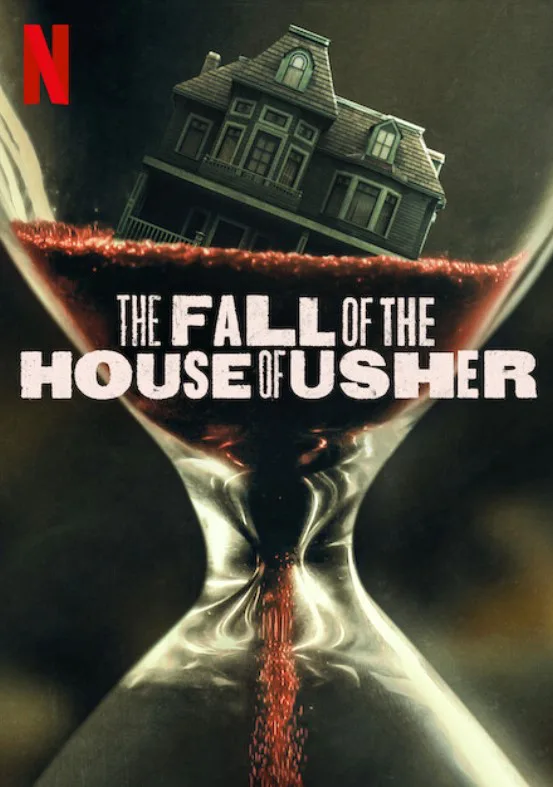“The Fall of the House of Usher” updates the work of Edgar Allan Poe for the era of Big Pharma, turning his most famous tales into a sprawling story of the decline of a wealthy American family. It’s “Succession” meets The Tell-Tale Heart, a story of vengeance, power, betrayal, and bloody parts. It can sometimes feel simultaneously overcrowded in its cramming in of various sources and narratively thin at the same time, but Mike Flanagan’s craft and his assemblage of returning performers keep this pendulum swinging through eight grisly episodes of horror television that should appeal to any fans of “The Haunting of Hill House” or “Midnight Mass.” In a month filled with surprisingly lackluster new streaming shows and films for horror fans, it’s a highlight.
Late one stormy night, Roderick Usher (Bruce Greenwood) invites an investigator named C. Auguste Dupin (Carl Lumbly) to his home. He offers to lay out the truth about his family’s criminal, violent history. Immediately, Poeheads should have a raised eyebrow as Dupin is a Poe character from works other than the one that gives this project a title, but Netflix and Flanagan’s “The Fall of the House of Usher” only uses the titular 1839 Poe story as the torso of the skeleton, attaching limbs based on other Poe works to it, including The Masque of the Red Death, Murder in the Rue Morgue, The Black Cat, The Pit and the Pendulum, The Raven, and many more. All of these nightmarish visions are attached to the family drama that Usher offers up for Dupin, giving the season a clever episodic structure in that each chapter intertwines a different Poe source into the overall saga of the Ushers.
It turns out that almost every branch of the Usher family tree has been cut by violent horror. How does Usher know all of these gory details? “I know because they told me,” says Usher. Dupin asks, “Before they died?” “No, not before,” he replies in one of the show’s many glimpses of Flanagan’s viciously dark sense of humor. (Poe had one too.) Roderick has been haunted by all his awful children who have shuffled off this mortal coil, and it’s because it feels like the ghosts are finally coming for him that he is ready to confess. He’s having visions of monstrous ghosts, including the recurring specter of Verna (Carla Gugino), a figure that connects most of these tall tales as a sort of vengeful force of karma, the devil come to take what she’s due from a man who profited off the pain of others.
Usher has been reimagined as the head of a massive pharmaceutical company he runs with his twin sister, Madeline (Mary McDonnell). Every episode includes flashbacks to a young Roderick (Zach Gilford), Madeline (Willa Fitzgerald), and Annabel Lee (Katie Parker), Roderick’s first wife. These fill in how the Ushers made their fortune, but they’re kind of a narrative drag. It’s important that Roderick and Madeline are cruel, selfish creatures—less so how they got that way. What’s more interesting is to watch how the fallout of their decisions fell on Roderick’s many children, all torn apart by some of Poe’s most memorable creations.
English majors will likely know where some of the stories are going just by seeing the episode names. When the young and trendy Prospero Usher (Sauriyan Sapkota) decides to host an exclusive sex-and-drugs party at one of dad’s old factories in an abbey, readers of The Masque of the Red Death will know it’s going to be a gruesome scene. However, Flanagan is smart enough to shift the Poe narratives ever so slightly for a modern audience. His version of The Tell-Tale Heart is a modern gem, and “The Gold-Bug” is reimagined as a new brand for the Usher company. But the themes remain the same—guilt, obsession, vengeance, and a supernatural sense of justice. Roderick Usher’s children are getting what they deserve, not merely because they are the fruit of a very poisoned tree but because they have made horrific decisions to stay in the shelter of wealth and privilege.
Prospero’s fate is merely the first as “The Fall of the House of Usher” also spins back to detail the truth behind the demise of Camille L’Espanaye (Kate Siegel), Leo Usher (Rahul Kohli), Victorine LeFourcade (T’Nia Miller), Tamerlane Usher (Samantha Sloyan), and Frederick Usher (Henry Thomas). Sliding through it all is the mysterious man who works as a sort of fixer for the Ushers, Arthur Pym (Mark Hamill), totally reimagined from the title character in Poe’s only complete novel, The Narrative of Arthur Gordon Pym of Nantucket.
When one steps back and looks at the whole narrative of the season of “The Fall of the House of Usher,” it sags in places. Most of the flashbacks to a young Usher and Dupin are thin, especially compared to the wicked fun on display in the fates of the Usher children. It feels like padding to get episodes to a full hour when Flanagan and company could have leaned even more into the episodic structure that highlights a single Poe per chapter. However, it’s an incredibly easy show to enjoy on an episode-by-episode basis, largely because Flanagan’s direction is sharp throughout, including excellent use of music and tight editing—some scenes are too underlit, but that’s just the Netflix brand nowadays, and I’m done fighting it.
While the writing is fun and the source material about as good as it gets, it helps “The Fall of the House of Usher” greatly that Flanagan reunited so many of his familiar faces. Everyone here is good; some people are great, particularly Greenwood and McDonnell. The former leans into his natural ability to command attention in a room, while the latter gets a juicy role and takes a full bite out of it. Lumbly’s decision to never wink at the camera adds gravity, while more fun, exaggerated performances like that of Thomas and Hamill can chew some scenery. It’s a great ensemble, brought together by the boundless potential of what a creative personality like Mike Flanagan could do with Edgar Allan Poe. That some of that potential feels too unbridled and shapeless is something that Poe didn’t often allow his characters to be: forgivable.
Whole series was screened for review. “The Fall of the House of Usher” launches today on Netflix.




















